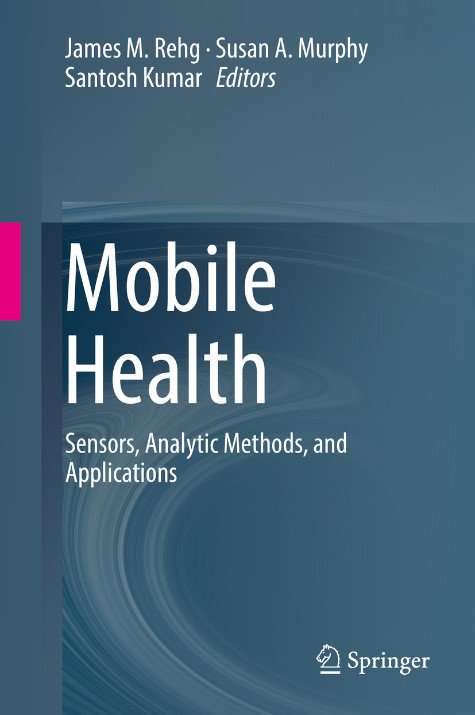 Three members of the research team at the Center of Excellence for Mobile Sensor Data-to-Knowledge (MD2K) are editors of a new mHealth textbook released recently by Springer.
Three members of the research team at the Center of Excellence for Mobile Sensor Data-to-Knowledge (MD2K) are editors of a new mHealth textbook released recently by Springer.
Mobile Health: Sensors Analytic Methods and Applications, provides a comprehensive look at the current state-of-the-art in mHealth technology that is accessible to technology-oriented researchers and practitioners who have backgrounds in computer science, engineering, statistics and applied mathematics.
“The authors of this book, led by the editors James Rehg, Susan Murphy, and Santosh Kumar, represent many of the most respected and accomplished leaders in this rapidly growing field. They together represent the diversity of disciplines that make up mHealth, Deborah Estrin, the Robert V. Tishman Founder’s Chair in the Department of Computer Science at Cornell Tech, said in her forward. “I expect this book to become an indispensable resource for community members as they address new research problems, prepare publications and grant applications, plan courses, and act as consultants to other practitioners or researchers.
Currently, mHealth research literature is spread across a diverse landscape ranging from scientific conference papers to medical journals. The editors hope that this new volume will provide a holistic view of this emerging and rapidly growing field that involve researchers from diverse disciplines. The textbook focuses on the use of mobile technologies for passive sensing, extraction of digital biomarkers via computational modeling and machine learning, time series pattern mining, and design and evaluation of sensor-triggered mobile interventions, which are key thrusts of mHealth research. Examples of mHealth applications include reducing sedentary behavior, improving physical activity, controlling impulsive eating, managing stress, preventing relapse to addictive behaviors, and reducing readmission among cardiovascular patients, among several others.
“There has been a lack of comprehensive reference book that newcomers in mHealth could use to get a first introduction of the mHealth field,” said Kumar, the Lillian & Morrie Moss Chair of Excellence in Computer Science at the University of Memphis. “This book offers a systematic introduction of mHealth to newcomers and suggests novel research directions to established researchers.”
The book is designed to provide an in-depth exploration of three key elements of mHealth technology: development of on-body sensors that can identify key health-related behaviors (sensors to markers), the use of analytic methods to predict current and future states of health and disease (markers to predictors), and the development of mobile interventions which can improve health outcomes (predictors to interventions). The volume is organized into sections, with the first section devoted to mHealth applications, followed by three sections of collected articles devoted to the above three key technology areas. Each article can be read independently, but the organization of these articles will provide a logical flow from the design of on-body sensing technology, through the analysis of time-varying sensor data, to interactions with a user which create opportunities to improve health outcomes.
Rehg is a Professor in the School of Interactive Computing at Georgia Institute of Technology; Murphy is the H.E. Robbins Distinguished University Professor of Statistics at the University of Michigan.
Kumar is director of MD2K, and Rehg is deputy director and also heads the center’s data science research core. Murphy, an internationally-known statistician, is a member of the MD2K team developing interventions that are triggered by analysis of mobile sensor data.
The textbook is available online at Springer.com. (https://link.springer.com/book/10.1007/978-3-319-51394-2)

